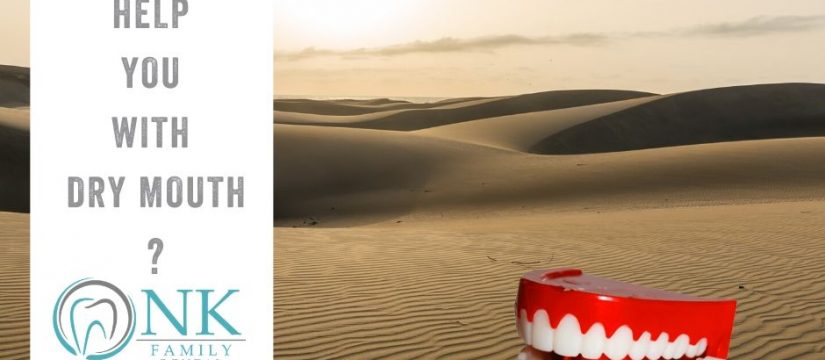
The cold and dry winter air may come and go, but what about the dryness in your mouth? Experiencing a dry mouth for a long period of time could be a sign or side effect of various oral or overall health conditions. Understanding what could be causing your dry mouth is the first step to effectively treating it. While some causes can be aided by adjusting daily habits, your dentist can also be a great resource for diagnosing causes and providing effective treatment for dry mouth.
When Should Dry Mouth Be a Concern?
Dry mouth, also known as xerostomia, occurs when your mouth does not produce enough saliva, which is a necessary fluid for properly eating, drinking and speaking. Saliva is also essential for preventing tooth decay, neutralizing acids and fighting bacteria in the mouth. Without a functional amount of saliva, you run an increased risk for cavities, tooth decay, infections and gingivitis.
As we discussed in our blog post — “Why You Should Take Dry Mouth More Seriously” — untreated dry mouth can lead to a number of uncomfortable or even painful symptoms. Everyone experiences dry mouth every now and then. However, it’s important to take notice when the following conditions are experienced for a prolonged period of time when coupled with dry mouth:
- Burning sensation in the mouth
- Difficulty speaking or swallowing
- Consistently hoarse or sore throat
- Dry nasal passages
- Frequent bad breath (halitosis)
- Irritated gums
- Cracked lips
- Mouth sores
Experiencing any of these symptoms when paired with having a dry mouth over an extended period can indicate the need for oral intervention in order to prevent worsening oral conditions.
What Could Be Some Causes?
There are many potential causes of dry mouth. Some causes are preventable, but others cannot be avoided as a side effect of health conditions or medical treatments. Despite some causes of dry mouth that can’t be prevented, there are still many ways to help diminish and alleviate symptoms of dry mouth.
Below is a list of common potential causes of dry mouth:
- Dehydration
- Some medications (including blood pressure and pain medications, antihistamines, antidepressants and appetite suppressants)
- Smoking tobacco or marijuana
- Radiation therapy to the neck or head
- Tranquilizers
- Stress and anxiety
- Aging
- Heavy mouth breathing
- Botulism poisoning
- Systemic autoimmune disorders (such as Sjögren’s syndrome)
- Other health conditions (such as diabetes, Alzheimer’s disease, HIV and AIDS, cystic fibrosis and oral thrush)
What to Do Until You See Your Dentist
Visiting your dentist and doctor are the best ways to receive an accurate diagnosis of what could be causing your dry mouth. With an accurate diagnosis, you can then receive effective treatment for the causes or — if unable to eliminate the root cause — the symptoms of dry mouth. Scheduling semi-annual checkups with your dentist ensures your oral health is closely monitored along with your overall health.
Your dentist may recommend a number of products and at-home actions to treat dry mouth, depending on your individual situation, in addition to recommending a visit to your doctor if deemed necessary. Products designed to fight dry mouth that your dentist may recommend include dry mouth gel (to alleviate pain and discomfort) and fluoride toothpaste (to prevent tooth decay). If your dry mouth is a result of another medical condition, your doctor will be able to appropriately adjust medications and provide further treatment recommendations. However, it is important to first see your doctor before altering your medication regimen.
In the meantime, before you can see your dentist, consider taking these actions to help alleviate your dry mouth:
- Drink more water and sip often
- Avoid or reduce consumption of sugar, salt, caffeinated drinks, and alcohol
- Drink with a straw if swallowing liquid is difficult
- Use sugar-free gum or sugar-free candy to stimulate saliva flow
- Suck on ice cubes
- Avoid tobacco products
- Use a humidifier at night
Of course, maintaining a good oral hygiene routine is the first step to improving oral health, fighting dry mouth and reducing the risk of tooth decay. A good daily oral hygiene routine includes brushing twice daily, flossing at least once a day, and using an antiseptic mouthwash. A long-term oral hygiene routine will include semi-annual checkups with your dentist.
Dry Mouth Relief in Chicago
For finding relief and treatment for dry mouth and its symptoms, visit Chicago’s own NK Family Dental. From your first visit to receiving one of our many dental treatment options, Dr. Khan and her staff strive to provide the most compassionate, thorough, high-quality oral care possible. Contact us today to schedule your next appointment and feel relief once again!
